PCP (Phencyclidine): short-term and long-term health effects
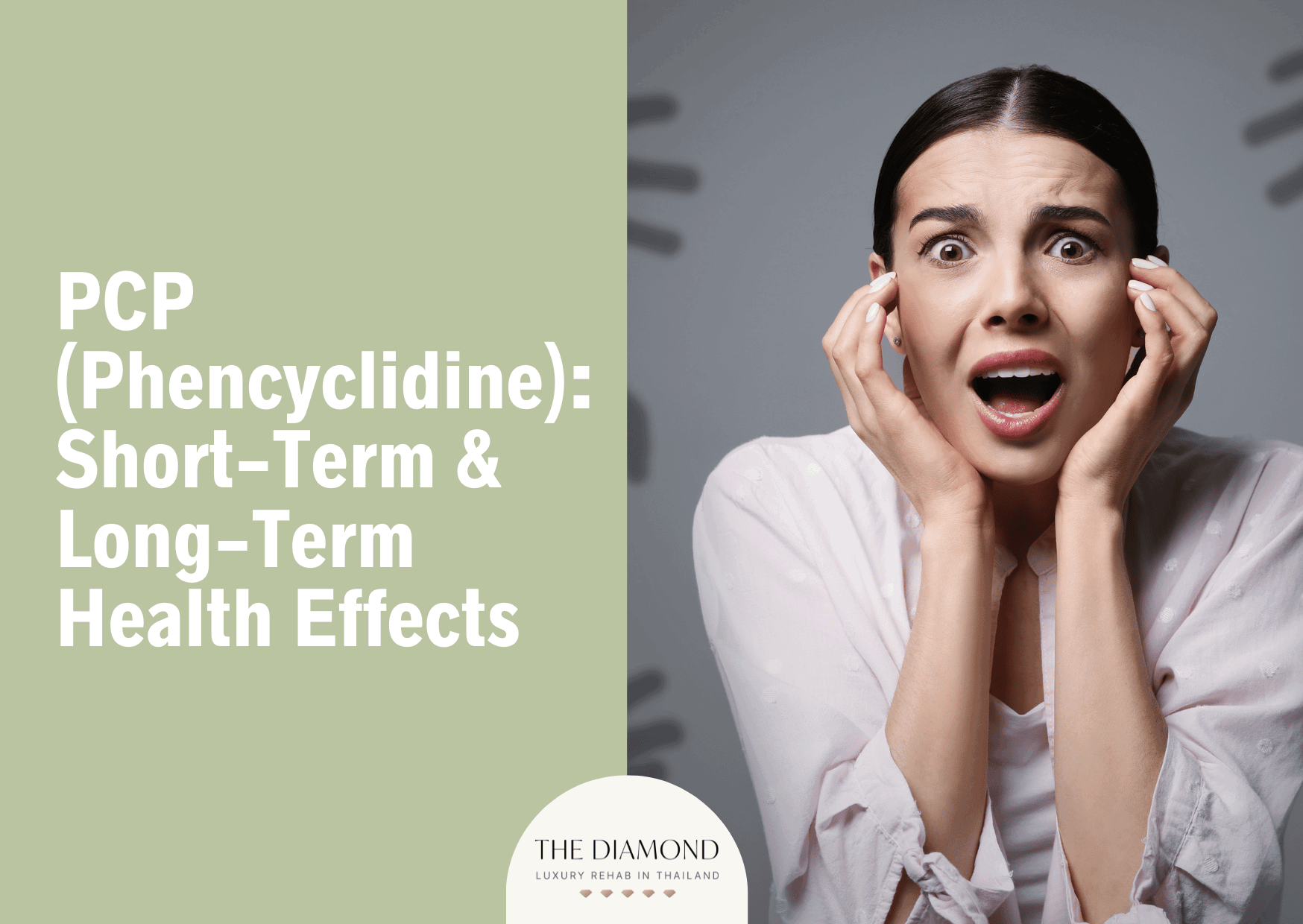
Phencyclidine (PCP) is a Schedule II substance with hallucinogenic effects and the potential for abuse and addiction. PCP is more commonly known as angel dust. People use it as a club drug to become more euphoric or excited. However, PCP induces hallucinogenic effects that lead to detachment from reality.
The drug causes numerous short- and long-term health effects. The most common short-term effects of PCP include euphoria, distortion of sounds and images, depersonalization, loss of balance and coordination, acute anxiety, fear of impending doom, and numbness in arms and legs.
Long-term phencyclidine effects range from speech difficulties and memory problems to anxiety and depression, social withdrawal, suicidal thoughts, and flashbacks.
What is Phencyclidine (PCP)?
Phencyclidine (PCP) is a dissociative hallucinogenic drug that was initially developed as a general anesthetic. The drug was first synthesized by Victor Maddox, a chemist from Michigan. Parke, Davis, and Company (now a subsidiary of Pfizer) marketed PCP as an anesthetic in 1956. At the time, PCP was known as Sernyl.
What is PCP made of? This synthetic drug is made from a combination of compounds and chemicals such as potassium cyanide, hydrochloric acid, ether, and bromobenzene.
In a nutshell, Phencyclidine (PCP) is a bitter-tasting, white crystalline powder that easily dissolves in alcohol or water.
The United States Drug Enforcement Administration classifies PCP as a Schedule II drug. Schedule II indicates a substance has a high potential for abuse, with use leading to potentially severe physical and psychological dependence. That is why the use of PCP is illegal, which applies to other substances from the PCP drug class too.
The use of PCP as an anesthetic has been discontinued, but it has become a popular club drug. People use PCP to achieve euphoria and for its hallucinogenic effects.
In most cases, PCP is sold in its original form, and it can be ingested orally, smoked, snorted, and injected. It comes in the form of tablets and capsules, but it’s also possible to get it in powder or liquid forms. People tend to smoke PCP drugs together with marijuana, tobacco, and other plant leaves. They also dissolve PCP in a liquid where they dip joints or cigarettes.
When PCP is smoked, injected, or snorted, a person typically feels the effects within two to five minutes. Oral ingestion of PCP has a longer onset of action; it may take 30 to 60 minutes for the drug to kick in.
The effects of PCP usually last six to 24 hours, but sometimes their duration is up to 48 hours. Although some people consider PCP a harmless party drug, repeated use can lead to tolerance, dependence, and addiction.
The first reports of PCP abuse were recorded in the 1960s in Haight Ashbury, San Francisco. This district was known as one of the most popular spots among followers of the hippie movement.
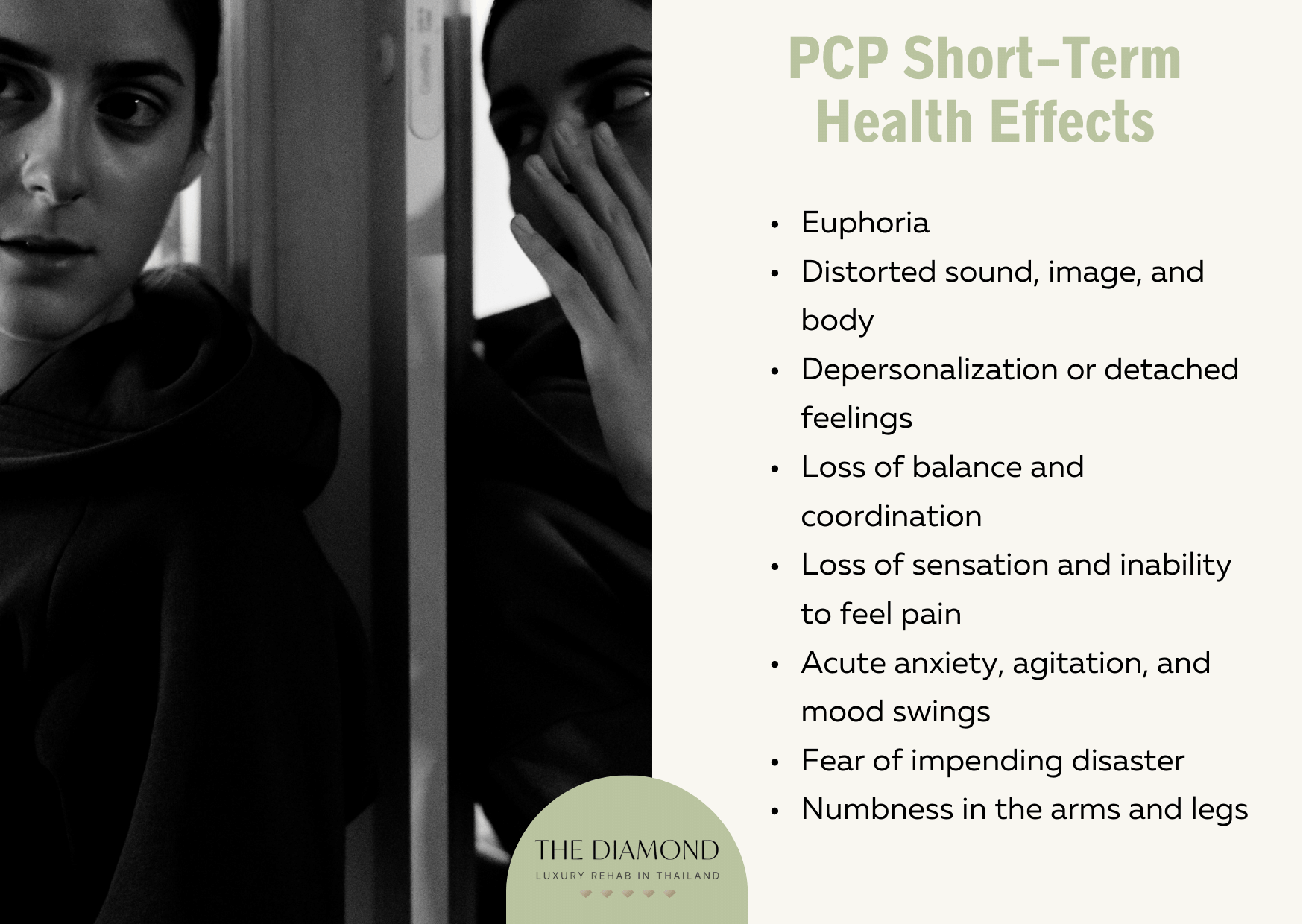
What are Phencyclidine (PCP) short-term health effects?
Short-term health effects of phencyclidine (PCP) are the acute effects of this drug. They tend to go away once the substance leaves the body and don’t persist for weeks or months. The most common short-term health effects of PCP are listed below.
- Euphoria
- Distorted sound, image, and body
- Depersonalization or detached feelings
- Loss of balance and coordination
- Loss of sensation and inability to feel pain
- Acute anxiety, agitation, and mood swings
- Fear of impending disaster
- Numbness in the arms and legs
Phencyclidine’s short-term health effects depend on the dosage and how the drug is taken. Although people tend to use PCP to experience euphoria, they experience additional unwanted effects that often put them in danger. Since PCP leads to dangerous effects, it’s not uncommon for people to end up in the emergency room. Their perception of reality is impaired, which is why users are more prone to accidents and other injuries. One of the biggest short-term effects of PCP is poisoning, which often occurs accidentally.
1. Euphoria
Euphoria is a state of intense happiness and excitement. At lower doses, PCP makes a person euphoric. Even though this subject requires further research, euphoria after PCP use results from changes in brain chemicals.
Dopamine is the main chemical in the brain that is responsible for euphoria. Phencyclidine acts on dopamine and creates a “fertile ground” for a short-term wave of euphoria. In fact, people choose PCP to experience this intense excitement and happiness.
While PCP causes euphoria, it’s important to keep in mind this effect is short-term. Chronic use of PCP has the opposite effect and leads to depression in the long run. In other words, using PCP to lift one’s mood and make oneself feel happy is not recommended. Euphoria, caused by PCP, leads to engaging in risky behaviors and reckless decisions.
2. Distortion of sound, image, and body
Distortion of sound, image, and body refers to the impaired perception of sight, sound, and reality. As a hallucinogen, PCP affects the way people perceive what they hear or see. For that reason, they struggle with distorted images, sizes, and sounds. As a result, a person feels as if they’re hearing colors or seeing sounds. This happens due to the alteration of functional connectivity in the brain due to PCP use.Imbalances of neurotransmitters such as acetylcholine are behind this effect of PCP. Although this health effect is short-term, it has a major impact on a person’s mental health. Distorted sounds and images further contribute to hallucinations, psychosis, and panic attacks, all of which put a PCP user in danger.
3. Depersonalization and detached feelings
Depersonalization is the feeling of being disconnected or detached from oneself and their surroundings. Hallucinogens such as PCP cause depersonalization and detached feelings among users.
The exact cause of depersonalization disorder among PCP users, and people who use other substances, is unknown. A potential correlation exists between symptoms of depersonalization and a “disconnection” of the amygdala, prefrontal structures, and anterior cingulate cortex (ACC) comprising the cortico-limbic brain system, a 2017 paper by Krause-Utz et al., from the Current Psychiatry Reports explained.
Disruption of social behavior in PCP users involves the dysfunction of the amygdala. At the same time, PCP affects the prefrontal cortex and ACC, which are involved in processing behavior and emotion. By affecting these important parts of the brain, PCP causes extreme effects such as detachment from reality, emotions, and surroundings.
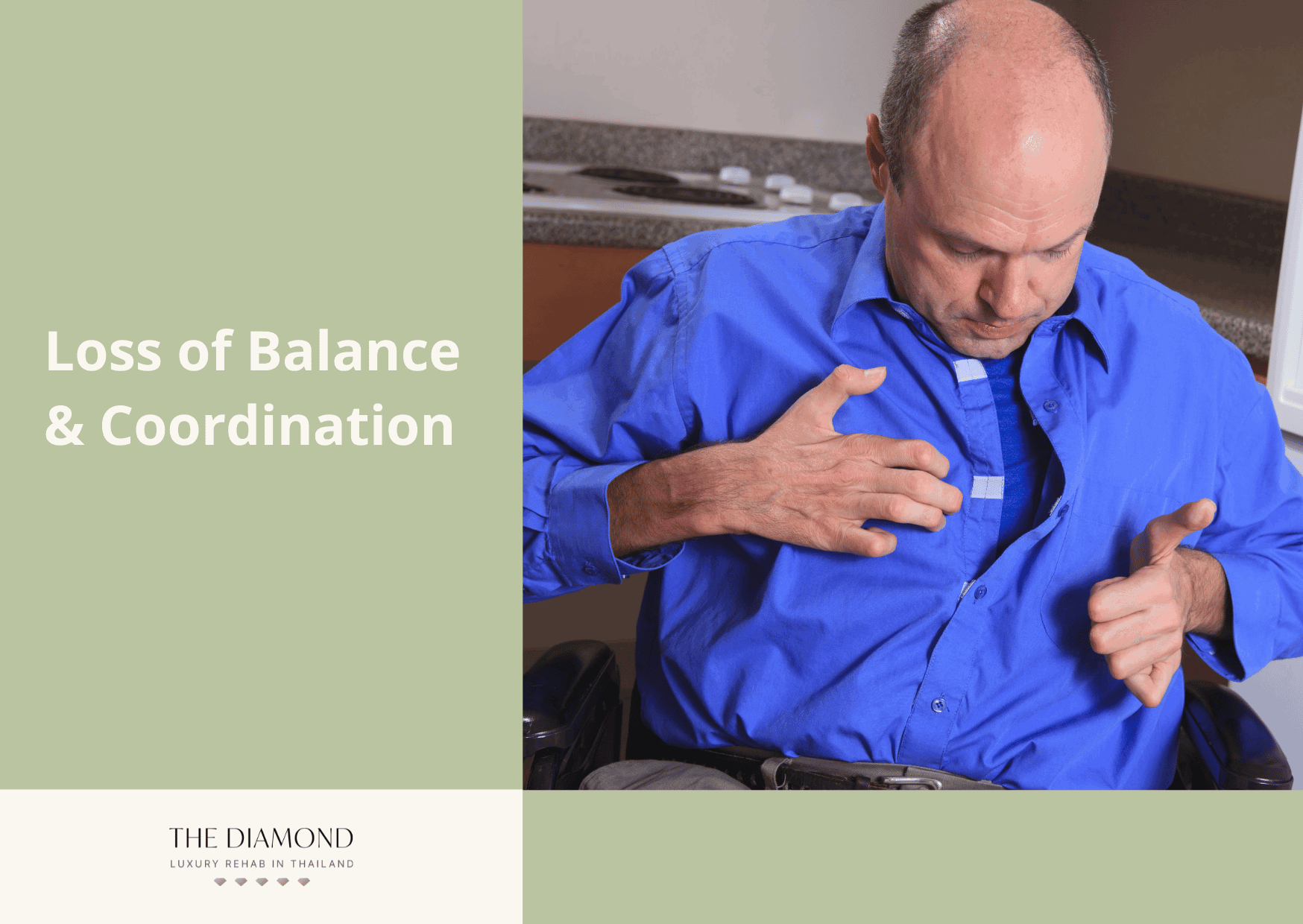
4. Loss of balance and coordination
Loss of balance and coordination is known as ataxia. One of the most pronounced short-term PCP symptoms is impaired muscle coordination and balance. Ataxia usually happens due to damage to the cerebellum and its connections. The cerebellum is part of the brain that controls muscle coordination.
While PCP is usually explored for its impact on the hippocampus, evidence shows it affects the cerebellum. That means that by acting on this specific part of the brain, PCP leads to impaired coordination and balance. This puts a PCP user at a higher risk of falls, injuries, and other accidents. A study by Kim et al., published in the December 2003 issue of the Journal of Veterinary Science showed that decreased glutamate concentration contributes to ataxia. Phencyclidine acts as a glutamate antagonist. This explains problems maintaining balance or staying coordinated among PCP users.
5. Loss of sensation and inability to feel pain
The loss of sensation and inability to feel pain (analgesia) is either partial or total. The use of PCP leads to the inability to feel pain for a while. This happens because PCP acts on NMDA and other receptors that are involved in pain sensation. Furthermore, PCP affects opioid receptors, which participate in regulating pain and other functions such as reward and addictive behaviors.
Impaired functioning of receptors that receive signals and help control pain lead to a lack of pain sensation among people who use PCP. For example, these receptors become too weak to receive and process pain signals. Lack of pain sensation initially seems like a good thing, but it is dangerous. This puts a PCP user at a higher risk of accumulating wounds, bruises, and other health issues that go undetected.
6. Acute anxiety, agitation, and mood swings
Acute anxiety is severe anxiety and panic that is so powerful they make a person feel like they have a heart attack. Agitation is an unpleasant condition of extreme arousal and restlessness. Mood swings are sudden or intense changes in emotional states. The use of PCP causes acute anxiety or makes a person agitated, easily irritated, frustrated, or moody.
Acute anxiety and other problems occur due to a sudden change in neurotransmitters with PCP use. In certain people, the effects of PCP are so unpredictable and cause erratic behavior and panic attacks. Acute anxiety manifests itself through panic attacks in addition to other symptoms such as heart palpitations (pounding heart) and chest pain.The neurotransmitter that plays a major role in acute anxiety symptoms, including acute anxiety and panic attacks, is norepinephrine. Serotonin plays a role as well. Since they regulate functions and emotions that affect the onset of anxiety, changes in these neurotransmitters become underlying causes of panic attacks and other symptoms. As seen further in this post, PCP acts on these neurotransmitters and affects their functioning.
7. Fear of impending disaster
Fear of impending disaster (or doom) is an impression or sensation that something horrible or tragic is about to happen. Phencyclidine users experience undesirable feelings such as fear of impending doom due to the physical and psychological effects of the drug. Taking PCP increases body temperature, blood pressure, and heart rate. At the same time, PCP triggers anxiety and its symptoms, including shortness of breath. When these symptoms are combined with dissociative effects and hallucinations, PCP users feel like they’re facing inevitable danger.
8. Numbness in the arms and legs
Numbness is the loss of sensation in a specific part of the body, in this case, the extremities. Even low to moderate doses of PCP cause numbness throughout the body and loss of coordination. In most cases, PCP makes a person’s arms and legs feel numb.
Drug-induced paresthesia (numbness) usually occurs in the form of tingling or numbness, burning sensation, pins and needles, and even itching. This effect is usually spontaneous, but sometimes external stimuli trigger it.
It’s not clear why PCP causes numbness in the arms and legs, but it’s likely due to its influence on neurotransmitters and various receptors in the brain. This drug causes “confusion” among receptors and chemical messengers that convert to physical effects such as numbness in extremities. At this point, evidence on this subject is scarce. A 2004 case report by Samir K. Praharaj published in the British Journal of Clinical Pharmacology revealed that serotonin reuptake inhibitors cause numbness even during withdrawal, during which serotonin receptors are hypersensitive, and it causes tingling in arms and legs. That’s important because PCP inhibits the reuptake of serotonin (learn more about it below).
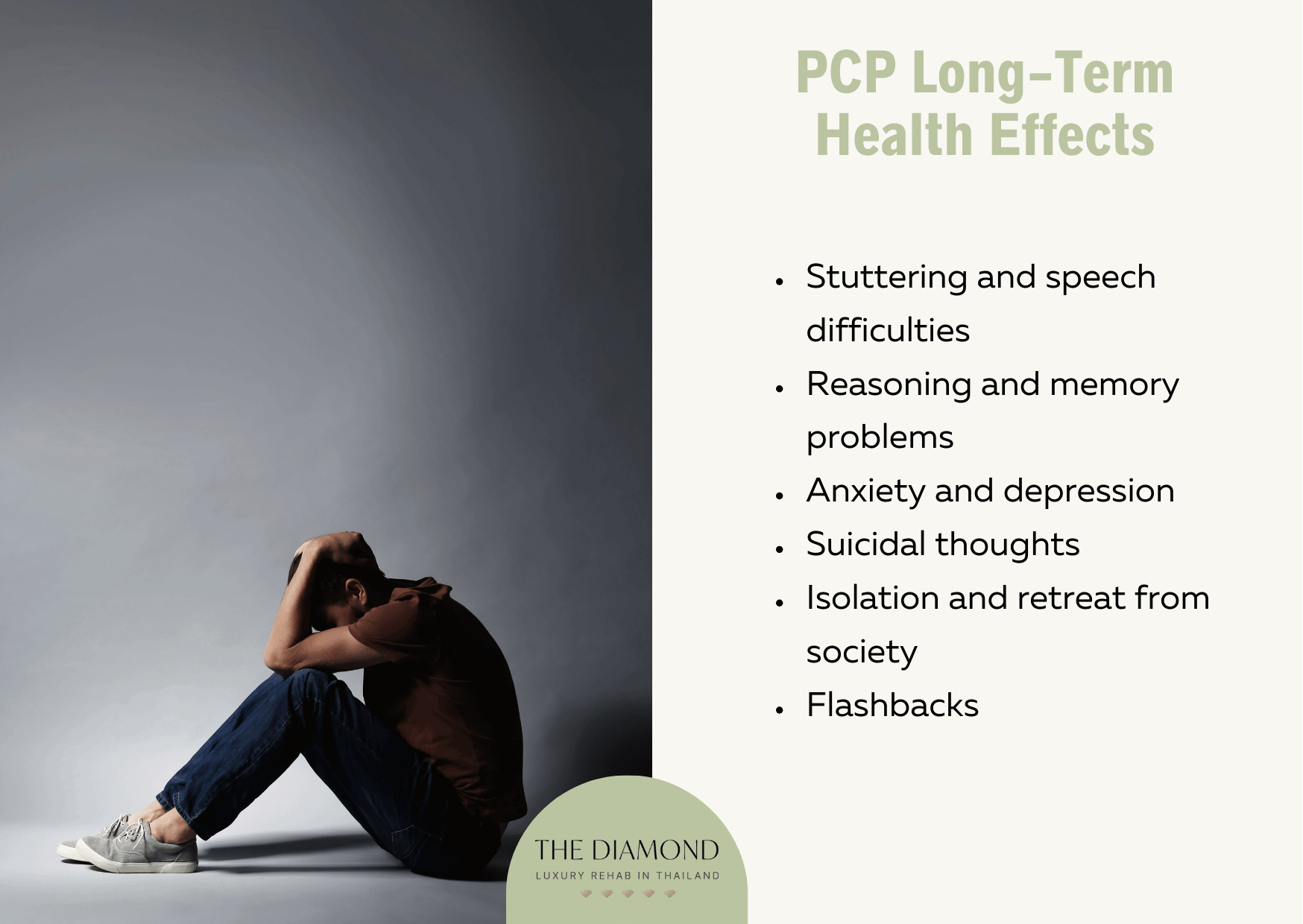
What are Phencyclidine (PCP) long-term health effects?
Long-term health effects of phencyclidine (PCP) are the complications that chronic PCP users experience long after they stop using the drug. The long-term health effects of phencyclidine (PCP) abuse are listed below.
- Stuttering and speech difficulties
- Reasoning and memory problems
- Anxiety and depression
- Suicidal thoughts
- Isolation and retreat from society
- Flashbacks
Long-term effects of PCP last for up to a year in case of serious abuse. Sometimes, they last longer than that. The use of PCP causes serious hallucinations or flashbacks, just like MDMA or X, which put a person in danger. In most severe cases, a person develops an addiction to PCP and experiences even greater difficulties with functioning socially, professionally, and financially. It’s useful to mention that PCP use affects a person’s physical and mental health.
1. Stuttering and speech difficulties
Stuttering is characterized by the repetition of syllables or words, their prolongation, and interruptions in speech. With long-term use of PCP, people develop major speech difficulties that include trouble articulating, inability to speak, and stuttering. People with speech difficulties tend to isolate themselves from their family and friends.
Evidence confirms that PCP-related problems often manifest themselves in the form of speech difficulties, but the underlying mechanisms behind this effect are unclear. The World Journal of Psychiatry published a review by Naemeh Nikvarz and Salehe Sabouri in 2022 that explored drug-induced stuttering.
The review showed that impaired neurotransmission of dopamine contributed to this speech difficulty. Drugs or substances that impair glutamate neurotransmission further contribute to stuttering. This is important because PCP affects neurotransmission and balance of both dopamine and glutamate.
Speech difficulties make it difficult for a person to express themselves, which deepens their depression. People who abuse PCP often have reasoning problems which affect their thinking. Combining these two health effects makes PCP even more dangerous than people believe.
2. Reasoning and memory problems
Reasoning and memory problems refer to experiencing difficulties with logical or sensible thinking and forming memories or remembering information. Taking PCP takes its toll on an individual’s cognitive abilities, such as reasoning and memory. With long-term use of this drug, people experience learning and memory deficiencies that impair their daily functioning.
A 2010 study by Cunha et al., from the journal Frontiers in Molecular Neuroscience found that PCP use exhibits down-regulatory effects on BDNF mRNA levels in the brain. Here, BDNF stands for brain-derived neurotrophic factor, a key molecule responsible for plastic changes associated with memory and learning.
The drug acts on the prefrontal cortex and hippocampus, which lead to problems with cognitive functioning. This explains why people who use PCP tend to experience reasoning and memory problems.
After all, an impaired level of BDNF disrupts the balance between excitatory and inhibitory neurotransmission in the brain. As a result, the brain loses synaptic refinement, which leads to impaired long-term potentiation, learning, and memory.
Plus, PCP acts on NMDA and acetylcholine neurotransmitters in the hippocampus. When that happens, the brain loses the ability to encode information, which is necessary for transferring this info to long-term memories. Long-term use of PCP damages neurons that perform these roles. That’s why people experience memory issues long after they stop taking PCP. Experiencing memory and reasoning problems has a major impact on a person’s quality of life and further contributes to emotional struggles. That happens because failing to remember and store information is quite stressful for a person.
3. Anxiety and depression
Anxiety is an intense, excessive, or persistent feeling of unease, fear, and worry. Depression is a mood disorder indicated by a persistent feeling of sadness, helplessness, and loss of interest. One of the most pronounced long-term health effects of PCP use is the development or worsening of depression and anxiety. Even low doses of PCP cause these mental health problems.
Pharmacology Biochemistry and Behavior published a study that showed that withdrawal from a single dose of PCP alters behavior and affects anxiety. The same study revealed that the effects of PCP on anxiety depend on age and gender. For instance, PCP is anxiogenic (causes anxiety) in males and anxiolytic (reduces anxiety) in females.
However, with repeated use, PCP either contributes to the development of anxiety or worsen symptoms in people who already have it. Although more research is necessary to determine why anxiety is one of the long-term effects of PCP, it is potentially due to the drug’s impact on neurotransmitters such as serotonin, dopamine, and norepinephrine.
A paper by A. Mozayani published in the January 2003 issue of Forensic Science Review reported that PCP exhibits stimulant, analgesic, hallucinogenic, and depressant effects. It’s unpredictable which of these effects a person will experience. It depends on their personality, environment of use, and psychological state. In order to understand why PCP causes depression, it’s important to bear in mind the above mentioned neurotransmitters are implicated in this mood disorder too. Abuse of PCP creates a chemical imbalance that triggers depression. At the same time, depression contributes to worsening other long-term effects of PCP, including suicidal thoughts and social withdrawal.

4. Suicidal thoughts
Suicidal thoughts or ideation are a serious problem wherein a person actively thinks about taking their own life. Long-term use of PCP leads to suicidal thoughts primarily due to the severe depression that people experience. At the same time, chronic PCP use triggers the feeling of detachment that further contributes to suicidal ideation.
A 2018 study by De Berardis et al., from the International Journal of Molecular Sciences explained that impaired regulation of glutamate neurotransmission and NMDA receptors play a role in suicide. That happens because they lead to impulsivity and cognitive dysregulation. This finding is important because PCP acts on glutamate and NMDA. The long-term use of the drug intensifies the effects of PCP on the nervous system and further contribute to this damage, thus contributing to suicidal thoughts.
5. Isolation and retreat from society
Isolation or retreat from society is avoidance of interacting with other people or bringing communication with others to a minimum. Long-term use of PCP leads to social withdrawal, but the underlying mechanisms are unclear.
It was theorized social withdrawal was due to anxiety among PCP users. However, a 2017 study by Alexandre Seillier and Andrea Giuffrida from Behavioral Pharmacology found that anxiety scores were unchanged in PCP-treated animals, thus suggesting their social withdrawal doesn’t result from this factor.However, PCP is known for its potential to induce psychosis symptoms, and social withdrawal is one of them. For that reason, phencyclidine’s role in encouraging psychosis is behind a person’s tendency to spend more time alone and isolate oneself from friends and family. Hallucinations contribute to this behavior as well.
6. Flashbacks
A flashback is a vivid experience wherein a person relives certain aspects of traumatic events and other situations as if they are happening at the moment. Long-term use of PCP leads to a condition called hallucinogen persisting perception disorder (HPPD). Basically, HPPD is a non-psychotic disorder that involves persistent or lasting visual hallucinations or perceptual distortions.
A person experiences flashbacks even if they haven’t used PCP lately. That happens because PCP causes flashbacks days, weeks, or months after the last use. According to a paper from Frontiers in Psychiatry, HPPD is a chronic and potentially irreversible syndrome.
It’s not entirely clear how PCP causes flashbacks, but it is likely due to impaired serotonin neurotransmission. Users of PCP tend to be vulnerable, or predisposed, to continue centrally processing visual imagery after the visualization has been eradicated from their visual fields. In other words, certain individuals are prone to experiencing flashbacks caused by PCP and other psychedelics.
Flashbacks have physical and psychological, or emotional symptoms. For example, a person with HPPD notices intensified colors or flashes of color and color confusion, experiences size confusion, sees halos around objects, and sees geometric patterns. Difficulty reading and feeling uneasy are other symptoms of HPPD. Additionally, HPPD causes anxiety and panic, suicidal thoughts, and depersonalization or derealization.
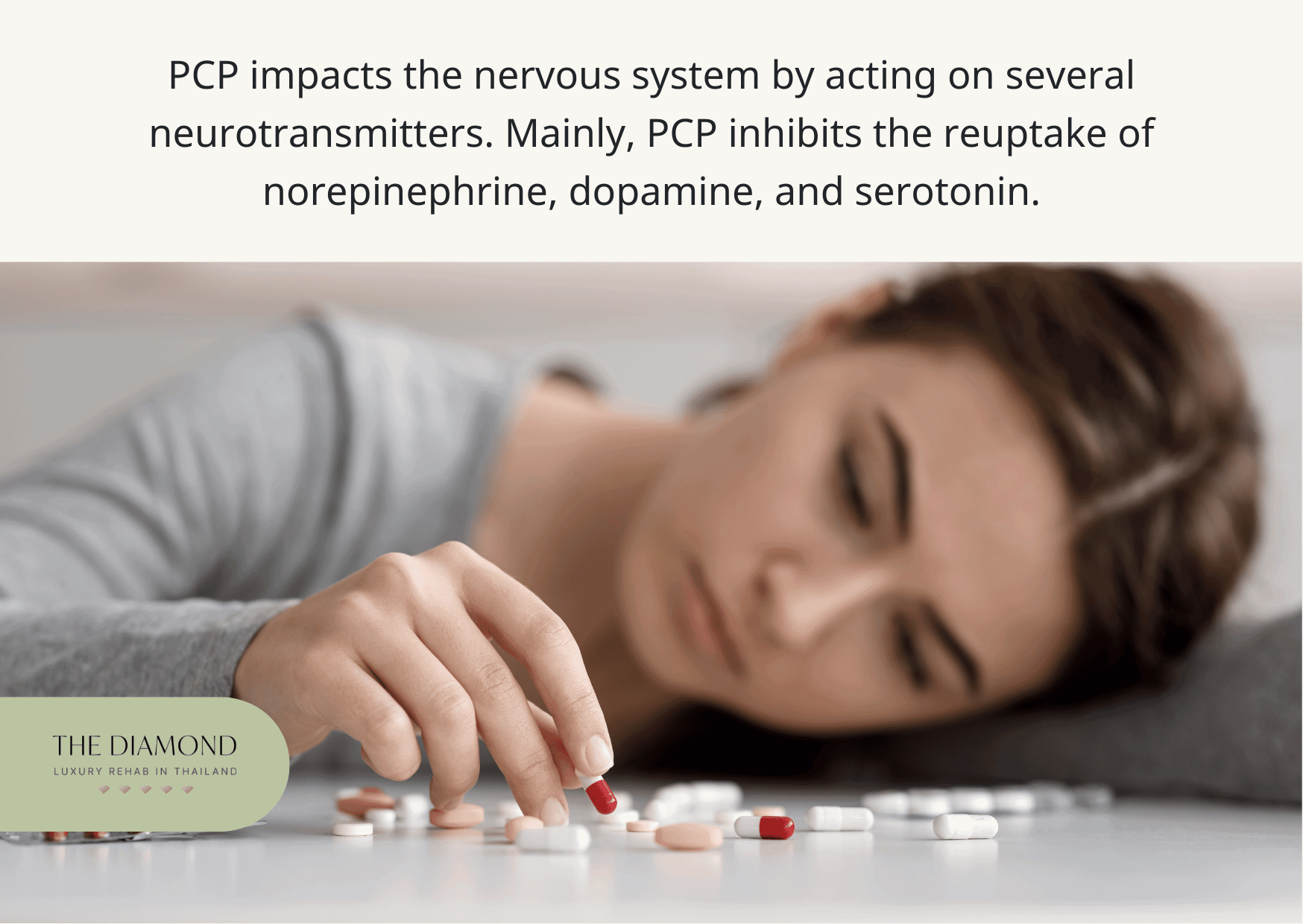
Why was the use of PCP discontinued?
The use of PCP was discontinued because it caused patients to become irrational, delusional, and agitated. The drug caused postoperative psychosis, dysphoria (profound state of dissatisfaction or unease), and severe anxiety. In 1965, the use of PCP was discontinued in humans, but it was still used as a tranquilizer for animals, an article titled, “Facts You Should Know About PCP” from the Illinois Department of Human Services reports. Later, veterinary use of PCP was discontinued as well.
How does PCP impact the nervous system?
PCP impacts the nervous system by acting on several neurotransmitters. Mainly, PCP inhibits the reuptake of norepinephrine, dopamine, and serotonin. Inhibiting the reuptake of neurotransmitters refers to increasing their concentrations. This is achieved by preventing neurons from reabsorbing (reuptake) them.
Reuptake is a normal function. Inhibiting this activity leads to excessive levels of their neurotransmitters and consequences such as increased wakefulness and energy. Insomnia, agitation, and decreased appetite happen as a result too.
Additionally, PCP blocks NMDA receptors to interrupt the activity of glutamate. These particular receptors are responsible for emotions, pain sensation, memory, and learning. By impairing these receptors, PCP enables the brain to disconnect from reality or normal sensory experiences. That said, higher PCP doses exhibit excitatory effects on NMDA receptors.
A review by Contreras et al., titled, “Phencyclidine. Physiological actions, interactions with excitatory amino acids and endogenous ligands” published in Molecular Neurobiology stated that PCP interacts with mu opioid, sigma, nicotinic, and muscarinic receptors. These receptors are implicated in various conditions, including addiction, pain, and depression. Since PCP acts mainly on neurotransmitters, it impairs delicate balance in the brain, and the “messages” get mixed up. This leads to PCP psychosis and other effects, but further research is necessary to elucidate the exact mechanism of action through which PCP works or acts on the brain.
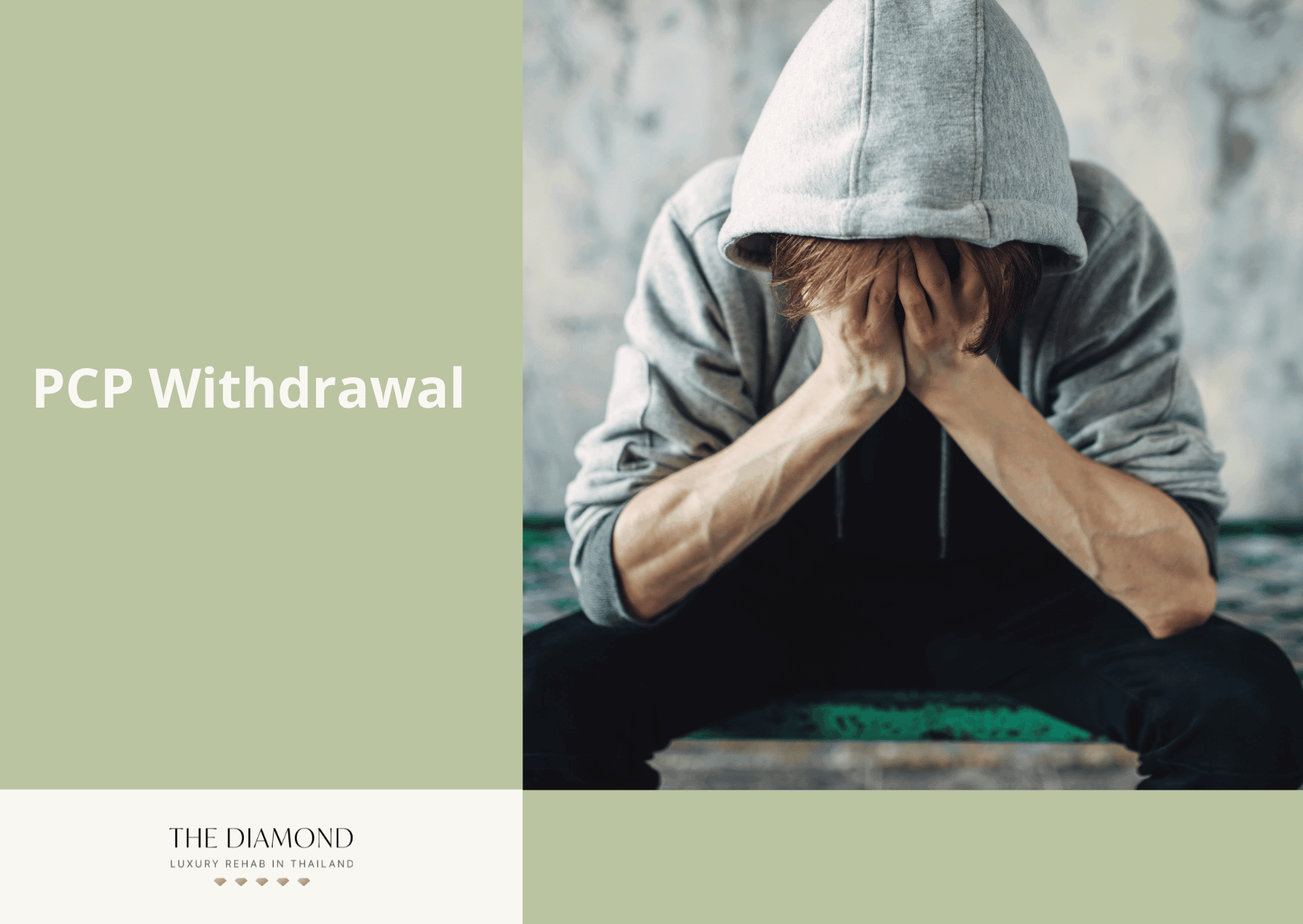
What are the slang terms for PCP?
Slang terms for PCP drugs include angel dust, kools, hog, lethal weapon, rocket fuel, jet fuel, happy sticks, peace pill, DOA, trank, killer weed, ozone, wack, supergrass, Bella donna, and cliffhanger.
Other PCP street names include angel mist, angel hair, gorilla tab, gorilla biscuits, green leaves, horse tracks, horse tranquilizers, juice, Kaps, k-blast, leaky leak, love boat, mad dog, mad man, magic dust, and mean green.
People use other names as well to refer to PCP. These include mist, monkey dust, new acid, new magic, orange crystal, Paz, peep, peace pill, Peter Pan, pig killer, purple rain, puffy, red devil, rupture, stardust, spores, sherms, surfer, tic tac, taking a cruise, zombie, yellow fever, wobble weed, wolf, wet, worm, white horizon, tish, and venom.The terms wet and zoom refer to combining PCP with marijuana. Names for a combination of PCP and cocaine include whack and space. Alien sex friend is a combination of PCP and heroin, whereas black acid is a slang term for mixing PCP with LSD. Domex is a slang term for mixing PCP with MDMA, a 2017 article titled, “PCP Drug Slang/Code Words” from Clinical Pain Advisor reported.
How to withdraw from PCP?
The ways on how to withdraw from PCP pertain to the methods and strategies involved in discontinuing the use of phencyclidine, a potent hallucinogenic drug. Tips on how to withdraw from PCP are listed below.
- Adhere to the PCP addiction treatment religiously
- Attend all therapy sessions regularly
- Find new interests and activities to replace PCP abuse
- Identify triggers that increase PCP use and avoid or reduce exposure to them
- Exercise regularly and eat a well-balanced diet
- Address the underlying problem such as depression, anxiety, or other issues that contribute to PCP abuse
- Relearn how to live without drugs by saying no or avoiding people who use PCP
The PCP withdrawal is long-lasting and uncomfortable because the drug binds to the brain and fat tissue in the body. As a result, it takes several days for PCP to clear from the body. Withdrawal symptoms manifest physically and psychologically.
For that reason, medical supervision is the best option. These symptoms usually occur during detox, i.e., the first stage of addiction treatment. During this time, patients learn to identify triggers, which are people, things, or situations that make them want to use PCP. Doing so is important for withdrawal from PCP and more successful treatment.The duration of withdrawal is different for each patient because several factors play a role. These factors include the length of PCP addiction, dosages taken, overall physical and mental health, and whether a person is using other substances too. For that reason, one mustn’t compare their withdrawal efforts and progress to someone else’s.
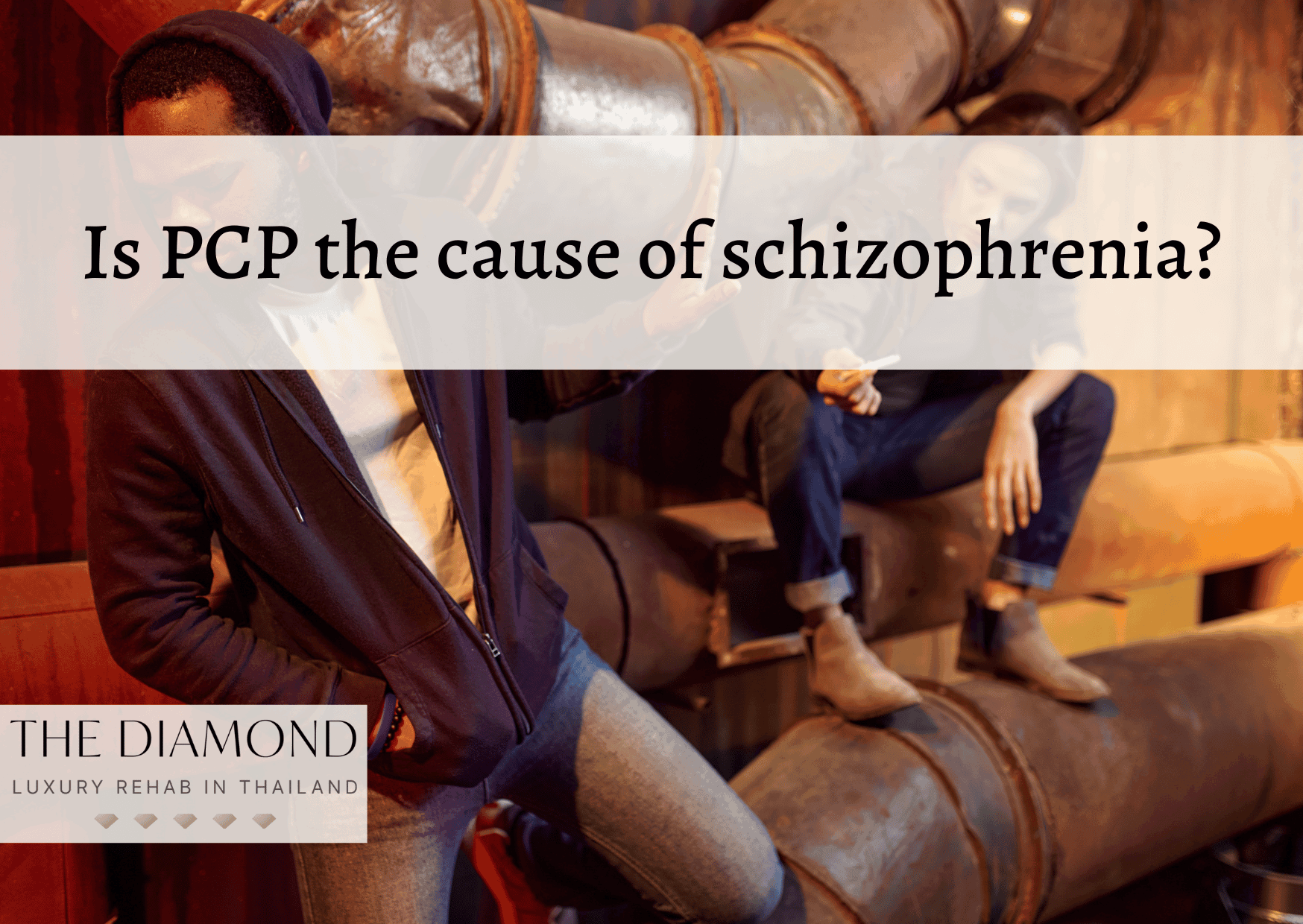
Is PCP the cause of schizophrenia?
PCP is not the cause of schizophrenia, but it worsens this (or other) mental health condition in people who have it and mimics the symptoms in individuals with no prior psychiatric illness.
A review by John B. Murray published in the May 2002 issue of the Journal of Psychology reported that PCP can induce symptoms resembling those of schizophrenia in healthy volunteers for a duration of several days to over a week.
Moreover, a 2007 paper by Tareg Bey and Anar Patel from the California Journal of Emergency Medicine, one of the most unusual features of PCP is that it induces psychosis or syndrome that mimics schizophrenia at doses of 5mg to 10mg orally. Doses higher than 10mg lead to coma.
It’s not clear why that happens, but neurotransmitter glutamate and N-methyl-D-aspartate (NMDA) possibly play a role. Glutamate is the most abundant excitatory neurotransmitter. On the other hand, NMDA participates in learning and memory, especially spatial memory.
The PCP acts as an antagonist of both glutamate and NMDA, i.e., it inhibits their activity. Glutamate abnormalities are present in people with schizophrenia. Since PCP inhibits NMDA, exposing the developing brain to this drug causes neurobehavioral deficits.
For example, a 2007 review by Mouri et al., published in Neurochemistry International found that treatment with PCP during pregnancy disrupts neural development and causes persistent behaviors similar to schizophrenia in later life.The potential of PCP to induce psychosis or mimic schizophrenia symptoms serves a good purpose – particularly for scientists – who use it in studies to develop medications and better treatments for this mental health condition.

